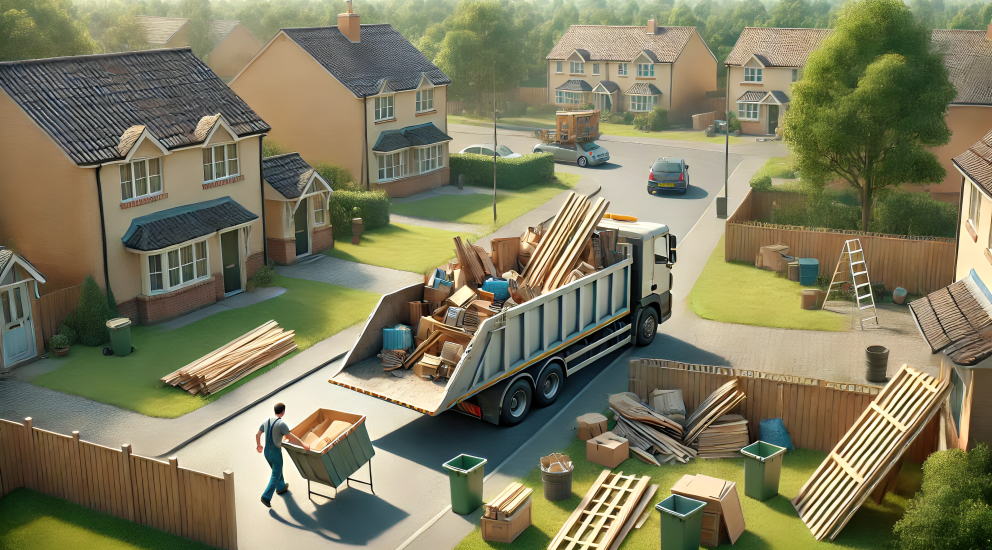Whether clearing out a home, landscaping a garden, or managing a construction project, hiring a skip can simplify waste removal. However, if you’ve never used a skip, the process can feel daunting. Understanding how skip hire works and what to expect will help ensure everything runs smoothly.
In this blog post, we’ll guide you through the process of skip hire—from selecting the right size to understanding permits—so you can manage waste effectively. With helpful tips and insights, we’ll demystify the process of hiring a skip and make your experience stress-free.
How Does Skip Hire Work?
Skip hire is a straightforward process designed to help you quickly eliminate large amounts of waste. Here’s a step-by-step breakdown of how it works:
- Choose a skip size: Skips come in various sizes, typically ranging from small 2-yard skips for light domestic use to larger 12-yard skips for commercial or construction waste.
- Contact a skip hire company: Contact a local provider like skip hire Windsor, who can help you choose the right skip for your needs based on the volume and type of waste.
- Arrange delivery: The skip hire company will deliver the skip to your specified location on a date that suits your schedule.
- Fill the skip: You can start loading your waste once the skip arrives. Be mindful not to overfill the skip, as most companies have strict guidelines for safe transportation.
- Collection and disposal: After you’ve filled the skip, the company will return to collect it. They’ll handle the disposal of the waste, ensuring it’s sorted and recycled where possible.
What Should You Expect from the Skip Hire Process?
Hiring a skip is an efficient solution, but there are a few essential things to remember. Knowing what to expect will help you avoid problems and ensure everything goes smoothly.
1. Permits and Placement
- If you plan to place the skip on public land (like a road or sidewalk), you’ll need a permit from your local council. The skip hire company usually assists you in arranging this.
- Ensure there’s enough space for the skip to be placed on your property, or choose a location that’s easily accessible for the delivery truck.
2. Types of Waste
Knowing what type of waste you’re disposing of is important before hiring a skip. Commonly accepted waste includes:
- Household waste
- Garden waste
- Building materials
- Furniture and appliances
However, skips can’t be used for hazardous materials such as:
- Asbestos
- Paints and solvents
- Electrical equipment (unless specified)
- Medical or biological waste
Always check with the skip hire provider for restrictions.
3. Skip Sizes and Costs
Skip sizes vary, and so do the costs. It’s important to choose the right size for your project to avoid paying extra for a larger skip than necessary or needing to hire a second one if you underestimate it. Some common sizes include:
- 2-yard mini skip: Suitable for small domestic projects, such as clearing out a shed or small room.
- 4-yard skip: Ideal for slightly larger home renovations or garden clean-ups.
- 6-yard skip: Often used for bigger domestic projects, such as kitchen or bathroom refits.
- 8-yard skip: Great for heavy waste, like rubble and soil from landscaping or larger renovations.
Get a clear quote before hiring so you understand exactly what’s included in the cost.
Benefits of Hiring a Skip
Skip hire offers several advantages for managing waste during a project. Here’s what you can expect:
- Convenience: Skip hire provides a convenient solution for handling large amounts of waste, saving you multiple trips to the local recycling centre.
- Time-saving: With a skip on-site, you can manage waste disposal as you work, rather than stockpiling rubbish and disposing it at the project’s end.
- Eco-friendly disposal: Reputable skip hire companies aim to recycle as much waste as possible, ensuring that less rubbish is in landfills.
- Cost-effective: Hiring a skip is often more economical than other waste removal methods for large projects. You pay a flat rate for the skip, no matter how much waste you produce within its capacity.
Important Things to Know Before You Hire a Skip
1. Filling the Skip
- Don’t overfill the skip, as most skip hire companies impose strict limits on how much waste can be loaded. Overfilled skips can be dangerous to transport, and the company may refuse collection or charge extra.
- Stack waste evenly within the skip, ensuring heavier materials are at the bottom, making disposal safer.
2. Duration of Hire
- Skips are usually hired for a set period—commonly a week to 14 days—depending on the duration of your project. If you need the skip for longer, ask the provider about any potential additional fees.
3. Alternative to Skip Hire
In cases where a skip is impractical— due to space constraints or the nature of the waste—alternative waste removal services, such as a wait-and-load service, might be worth considering. This service involves a truck waiting while you load your waste, which is taken away immediately, avoiding needing a permit.
Conclusion
Skip hire is an efficient and convenient way to manage waste for various projects, from home renovations to larger construction jobs. Knowing how skip hire works—from choosing the right size to understanding what types of waste are accepted—ensures that the process goes smoothly and you get the best value for your money.
A company like skip hire Windsor is experienced in providing tailored solutions to suit your specific needs. They can help you select the perfect skip size, advise on any necessary permits, and ensure your waste is disposed of responsibly.
In summary, if you need to manage a large volume of waste, skip hire is the perfect option. It saves you time, reduces stress, and is an environmentally friendly solution when paired with a reputable company. Plan ahead, choose the right skip for your project, and follow any guidelines to avoid unnecessary complications. With careful planning, skip hire can be a seamless part of your project’s success.





